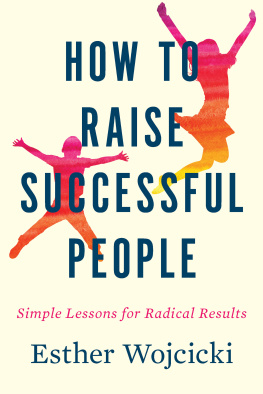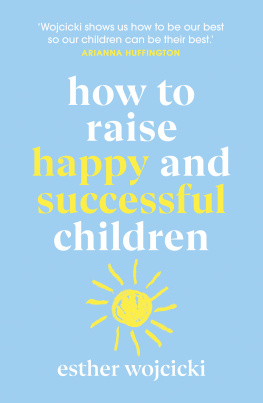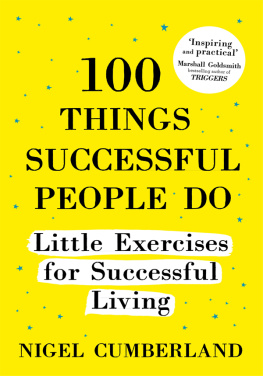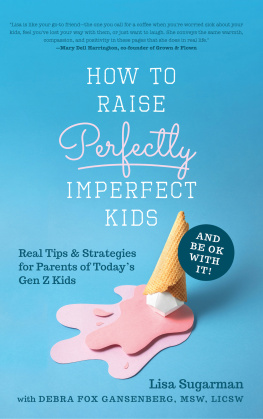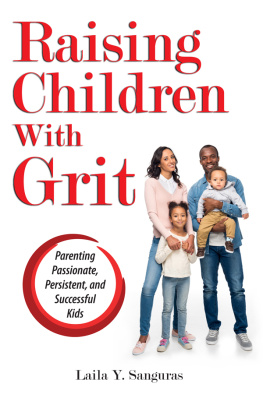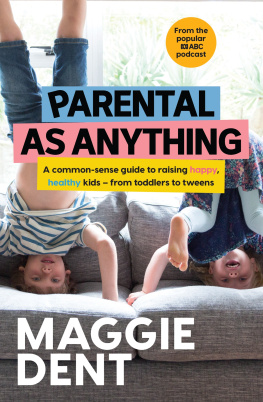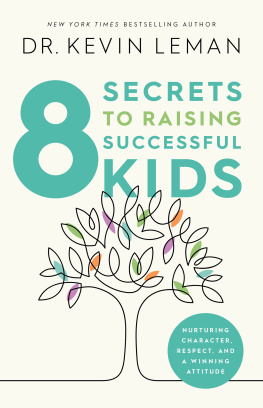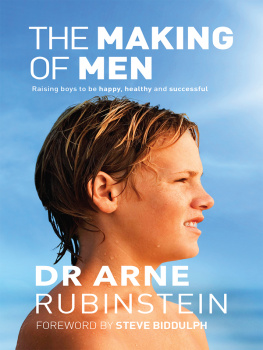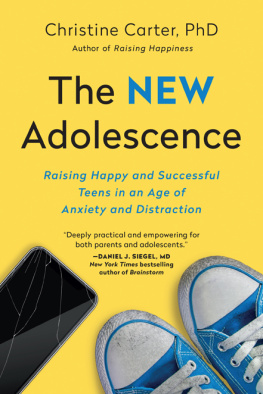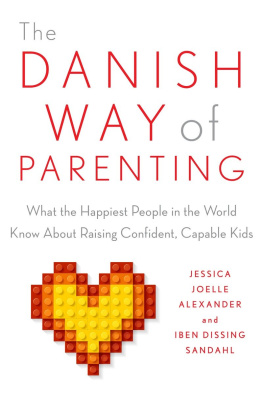Copyright 2019 by Esther Wojcicki
Foreword copyright by Susan, Janet, and Anne Wojcicki
All rights reserved
For information about permission to reproduce selections from this book, write to or to Permissions, Houghton Mifflin Harcourt Publishing Company, 3 Park Avenue, 19th Floor, New York, New York 10016.
The author has changed names and identifying details of some of her former students who appear in this book.
hmhbooks.com
Library of Congress Cataloging-in-Publication Data is available.
ISBN 9781328974860
ISBN 9780358120582 (international edition)
Cover design by Brian Moore
Cover images Shutterstock
Author photograph Jo Sittenfeld
eISBN 978-1-328-97493-8
v1.0419
To my husband, Stan, my three daughters, Susan, Janet, and Anne, my ten grandchildren, and all other members of my family, a wish for TRICK in their lives and in the world.
Foreword
AS THE THREE WOJ offspring, we thought it was only fitting that her children do the foreword on what it was truly like to be raised the Woj Way. Woj, of course, is the affectionate nickname coined by our mothers students decades agoit stuckand her method focuses on trust, respect, independence, collaboration, and kindness (TRICK), the universal values she explores in the coming pages.
Life has brought all kinds of surprises, from our careers at Google, YouTube, 23andMe, and the UCSF Medical Center, to the challenges of parenting our own children, a total of nine among the three of us. As we have ridden the ups and downs that come with any life, we owe much of our ability to thrive to the way our parents raised us.
When our mother told us she was writing this book, we dug up stashes of our journals from grade school through college. Our mother, forever the journalist, thought it was a great idea for us to keep journals for every trip, especially when we moved to France in 1980. While there are many fun stories of fights and bad behavior, there are also some key themes: independence, financial responsibility, actionability, open-mindedness, fearlessness, and an appreciation for life.
One of our greatest joys today is the feeling of independence. Our parents taught us to believe in ourselves and our ability to make decisions. They trusted us and gave us responsibility at an early age. We had the freedom to walk to school on our own, bike around the neighborhood, and hang out with our friends. We gained confidence that our parents reinforced by being respectful of our opinions and ideas. We dont remember ever having our ideas or thoughts dismissed because we were children. At every age, our parents listened and acted like it was a two-way street for learning. We learned to advocate for ourselves, to listen, and to realize when we might be wrong.
In tenth grade, Anne had an eye-opening discussion at our temple about relationships between parents and children. The parent she was partnered with talked about how it was the childs job to listen. She explained that in our family we argued, but that our parents always listened to us; they never just said, No, because Im the parent. She later wrote in her journal how grateful she was to have parents who didnt rule because of authority. We rarely fought. We argued, but we didnt fight. As a result, we are extraordinarily grateful to them for the early independence we experienced.
Hand in hand with independence is financial freedom. Financial freedom does not mean being rich; it means being careful with money and planning for those items or aspects in life deemed essential. Our parents are fiercely disciplined with spending and saving. Both grew up as children of immigrants and reminded us often of how people waste money on unnecessary items and then suffer by not being able to afford what they need. The importance of this came as daily lessons. We would go out to dinner but never ordered drinks or appetizers. Before we went grocery shopping, we always cut our coupons and went through the newspaper ads. Once, our mother brought home the extra airplane food from her recent trip and served it to Anne as dinnerher childhood friends have never forgotten!
When we were in grade school, our mother showed us a compound interest chart, and we became determined to save at least a couple thousand dollars every year. We got credit cards and checkbooks before we could drive because our mom wanted to teach us the discipline of paying off our credit card monthly and balancing our checkbooks. We were also encouraged to start our own little businesses as kids. We sold so many lemons from our neighbors abundant tree for years that the neighbors called us the lemon girls. Susan had a business selling spice ropes (spices on a braid to hang in a kitchen) and made hundreds of dollars as a sixth-grader. It was her idea, but our mom bought the supplies and supported her going out to sell them. We sold hundreds of Girl Scout cookies door to door. And when we were really bored, we would package up our old toys and try to sell them to the neighbors, who actually bought themsometimes.
As a family, travel and education were our top priorities, and everything else got minimal financial resources. (Note: Our father has been wearing the same pair of sandals for sixty years.) When we traveled, we stayed in the cheapest hotel, and always with a coupon. Spending money was all about making intentional choices. We were never wealthy, but our spending decisions allowed us the financial freedom to have the experiences we wanted in life.
Our mother is a master at never procrastinating or whining. If something can get done today, shes getting it done! She taught us all how to do the laundry, clean the house, vacuum, make phone calls, and exerciseall at the same time and in under an hour. We have never met anyone as efficient as our mother. She taught us how painless it is to just get something done versus procrastinating, how much better the weekend can be when homework is finished on Friday versus having it hang over your head all weekend and then finally doing it on Sunday.
While most of our moms philosophy was about building skills, she would occasionally resort to bribery. One example Susan remembers years later is her bad habit of biting her nails. Our mom promised her a bunny if she stopped. After six weeks of Susan not biting (Mom said this was the period of time necessary to break a bad habit), Mom bought her a pet rat since the storekeeper convinced her that a rat was a better pet than a bunny. In fact, she bought three pet rats: Snowball, Midnight, and Twinkle.
Our mom is a people person. She truly enjoys being around all different types of people and gives off a very warm, approachable air because she is open-minded about learning new things at all times. She is a natural entrepreneur, constantly open to change and innovation. It was not a coincidence or good luck that she was successfully able to incorporate technology into her lesson plans and classrooms as Silicon Valley was burgeoning; she loves to innovate. She is constantly learning from her students, and this is, in part, why they trust and respect herbecause she believes (and thrives herself) in their visions for change. Adults can be reluctant to change routines, making it difficult for them to engage with teenagers. But our momherself a senior citizen!is completely the opposite, and thats why students flock to her. They know she will respect them and encourage their ideas, no matter how crazy. Sometimes it appears that she prefers the crazier ideas! We are often astounded that our mom, who is in her seventies is energized (yes, not tired!) after a late night (almost midnight) with teenagers working on the school newspaper.
One of her best traits in being a teacher and parent is trying to really understand the student as a person and working within the students interests to be self-motivated rather than forcing them to do something. If one of us would come home and say we didnt like a subject, she would ask why. She would try to understand what was happening: Did we need the help of a tutor? Or did we have an issue with a teacher or other students? She would then try to come up with a solution that fit our needs and would help us solve the problem. Similarly, she worked to understand our passions over the years. She supported Annes interest in ice-skating, Janets focus in African studies, and Susans efforts with art projects. She inspired us with books, interesting articles, talks, and classes. She always let her students pick the topics for their newspaper and argue their own points of view. When we talk about parenting, she reminds us that we cant force a child to do something: we need to motivate them to want to do it themselves.

